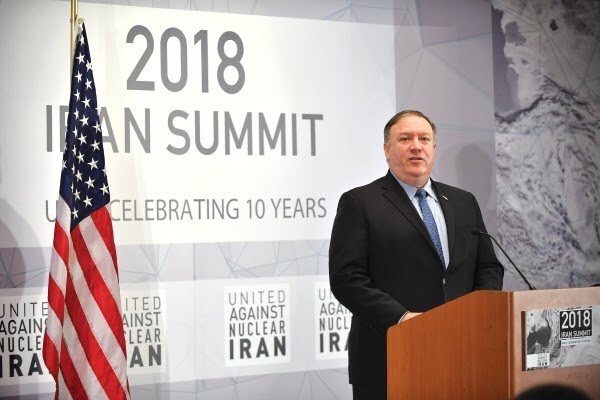
Return of the Bush Doctrine?
THE EDITORS
@TWS_OPINIONS
October 1, 2018 at 3:40 AM
On September 20, 2001, speaking to a joint session of Congress, President George W. Bush famously articulated the key component of what would later be called the Bush Doctrine: “From this day forward,” the president said, “any nation that continues to harbor or support terrorism will be regarded by the United States as a hostile regime.” It was an assertion of great moral clarity.
If the Bush administration didn’t always adhere to its own doctrine in subsequent years, the Obama administration repudiated it—nowhere more so than in the Joint Comprehensive Plan of Action (JCPOA), otherwise known as the Iran nuclear deal. Supporters of the 2015 agreement vehemently argued that the Trump administration should not pull the United States out of it because Iran was in compliance with its terms. We always doubted that claim—there was plenty of evidence that Tehran was flouting, for example, the agreement’s heavy-water limit—but the core problem with the Iran deal wasn’t so much Iran’s compliance or noncompliance as what the deal set aside. In short: The JCPOA allowed Iran to persist in rogue behavior—including its sponsorship of terrorism across the Middle East and beyond.
The Trump administration rightly and vocally rejected its predecessor’s insistence that Iran’s promise not to pursue nuclear weapons could be considered in isolation from its malign behavior as a terror sponsor. All week, in anticipation of President Trump’s addresses at the United Nations, top administration officials have been making that case. They’re not short on material.
“Iran’s leaders sow chaos, death, and destruction,” Trump himself said in remarks at the General Assembly. “They do not respect their neighbors or borders or the sovereign rights of nations. Instead, Iran’s leaders plunder the nation’s resources to enrich themselves and to spread mayhem across the Middle East and far beyond.”
Iran, he argued, has used the cash it procured through the nuclear deal to bolster its terror agenda, advance its missile program, and more. He’s right. Administration officials say any new deal must address these key deficiencies. In the meantime, the United States is reimposing sanctions lifted under the agreement in an effort to deprive the regime of its capacity to fund terrorist proxies.
Europe, which is sticking with the deal, wants to circumvent these sanctions. Secretary of State Mike Pompeo sent them a stark message on September 25: “By sustaining revenues to the regime, you are solidifying Iran’s ranking as the number one state sponsor of terror, enabling Iran’s violent export of revolution, and making the regime even richer while the Iranian people scrape by.”
Pompeo went on to note that Iran’s terror support is not confined to the Middle East, as the State Department’s yearly terrorism report, issued last week, made clear. Tehran has been caught conducting or supporting malign activities on U.S. and European soil. The State Department report cites the June 2017 arrest of suspected Hezbollah operatives in New York and Michigan. Another example offered by State’s coordinator for counterterrorism Nathan Sales last week: “On June 30th of this year, German authorities arrested an Iranian official for his role in a terrorist plot to bomb a political rally in Paris.” “Iran uses terrorism as a tool of its statecraft,” Sales added. “It has no reservations about using that tool on any continent.”
There’s also the usual support for terrorism across the Middle East, including cash, arms, and training for groups like Hamas and Palestinian Islamic Jihad, which hold as their goal the destruction of Israel. Lebanese Hezbollah also has a sweetheart deal with Tehran, which every year provides it with $700 million. And there’s Iran’s longstanding support for Syrian leader Bashar al-Assad, who has used chemical weapons against innocent civilians.
Much of Iran’s terror activity is conducted by its Quds Force, which has long been the country’s “primary mechanism for cultivating and supporting terrorists abroad.” Why does Iran use proxy groups to do its dirty work? According to the State Department’s report, “to shield it from the consequences of its aggressive policies.” In other words: to create plausible deniability.
Iran also harbors al Qaeda (AQ) operatives and “has refused to publicly identify the members in its custody,” the State Department noted last week in its report. It “has allowed AQ facilitators to operate a core facilitation pipeline through Iran since at least 2009, enabling AQ to move funds and fighters to South Asia and Syria,” the report reads. Adds a separate State Department report released this week: “As AQ members have been squeezed out of other areas, all indications suggest that they are continuing to find safe haven in Iran.”
Focusing on this reality doubtless makes life more difficult for our diplomats, but that’s thanks to the Obama administration’s naïveté. Diplomacy ought to be rooted in the world as it is, not as our leaders wish it to be, and above all else it should advance America’s interests, elevate our values, and ensure our security. The Trump administration has the right approach, as President Bush did 17 years ago: States that harbor and support terrorism deserve our hostility, not our money.
No comments:
Post a Comment